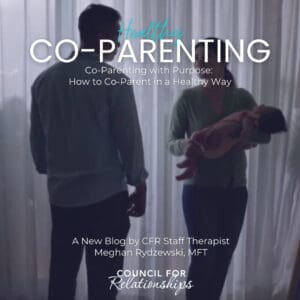Co-Parenting with Purpose: How to Co-Parent in a Healthy Way
Co-parenting is a skill that takes patience, communication, and support. In this blog, CFR Staff Therapist Meghan Rydzewski, MFT, explores how to co-parent in a way that centers the child’s needs. Learn why healthy co-parenting matters—and how it can improve connection, consistency, and emotional well-being for the whole family.
Why Is Co-Parenting Relevant Today?
In today’s world, co-parenting is not just common, it’s increasingly essential. Co-parenting is now a reality for many families due to cultural and societal changes.
Some examples include:
- Higher divorce and separation rates, which means more children are being raised across two households.
- Increasingly, couples are opting to raise children without marriage, and when these relationships evolve or dissolve, co-parenting becomes the primary framework.
- Blended families and remarriage often introduce new adults into a child’s life, requiring healthy collaboration between caregivers.
- Many LGBTQ+ and chosen families use co-parenting structures beyond the traditional two-parent model. A network of caregivers provides love, care, and guidance in ways that reflect the child’s best interest and the family’s unique structure.
- Geographic mobility for work, military service, or financial reasons makes co-parenting at a distance more common.
- A greater focus on children’s mental health has emphasized the importance of emotional stability, consistency, and healthy caregiver relationships.
These evolving family structures highlight one clear truth: what matters most is not who lives under one roof, but how adults work together to raise safe, loved, and emotionally supported children.
What Is Co-Parenting?
Co-parenting is the shared responsibility of raising a child between two or more adults who are not in a romantic relationship. This could include parents navigating separation or divorce, unmarried parents, or even platonic co-parents in blended or chosen families. Regardless of structure, the core of co-parenting is collaboration, respect, and a shared commitment to the child’s well-being.
Blended families and shared parenting are increasingly common. The way adults work together directly impacts a child’s emotional and psychological well-being. Healthy co-parenting benefits not only the parents but also provides children with a sense of security, stability, and trust.
Children are observant. They absorb more than we realize, not just what we say, but how we interact with each other. When parents work together, it creates emotional safety and consistency. Even if parenting styles differ, finding shared ground can help create consistency for the child.
When children see their parents communicating respectfully and supporting each other’s parenting, it reinforces the message that they are loved, secure, and not caught in the middle.
On the flip side, children can sense when tension exists between parents. They may feel responsible for the conflict or internalize stress that’s not theirs to carry. Over time, this emotional strain can manifest as:
- Anxiety or depression
- Sleep disturbances
- Behavioral issues
- Difficulty trusting adults or authority figures
Children do not need their parents to be best friends. What they need are adults who can work together with their best interests in mind.
Why Consistency is Important
Consistency across both households is also critical. When parents agree on routines, expectations, and boundaries, it reinforces a sense of structure and unity, even if they no longer live under the same roof.
It can also help prevent the child from playing one parent against the other. Such as “Well, Dad said I could go to bed at 9:30 pm at his house, why do I have to go to bed at 8 pm here?” This kind of mismatch can lead to parenting conflicts between households.
Finding a common time that is consistent at both houses can be helpful for the child to have consistency and get the same amount of sleep at both houses.
Acknowledging that Co-Parenting Can Be Challenging
It’s also important to acknowledge that co-parenting can be challenging for many reasons. But perfection is not the goal; progress is. With intention, patience, and open lines of communication, co-parents can create a healthy, supportive environment that honors the needs of the child above all.
At the heart of successful shared parenting is a commitment to the child’s well-being. Keeping conversations focused on the child—rather than past relationship dynamics or parenting conflicts—helps maintain clarity, minimize conflict, and support cooperation. This shared focus reminds co-parents of their common goal: to be the best parents they can be and have their child be at the forefront of their shared goals.
Parenting requires patience, flexibility, and care—and every moment of effort adds up. Your child is learning from you, not just how to be a child, but how to be a future adult in relationships, in conflict, and in connection.
Editor’s Note: The views expressed in this blog are those of the author and do not necessarily reflect the official policy or position of Council for Relationships.
Co-Parenting Support: CAFS, Family Therapy & Relationship-Focused Care
Healthy co-parenting starts with support. At Council for Relationships, we understand how challenging it can be to co-parent while managing your own emotions, your child’s needs, and past relationship dynamics. Our therapy and psychiatry services are designed to help you build stronger communication, reduce conflict, and center your child’s emotional well-being.
Child, Adolescent, & Family Services
Through our Child, Adolescent, & Family Services (CAFS) program, CFR offers therapy for children, adolescents, and the adults raising them—including co-parents, step-parents, and extended family.
Whether you’re figuring out how to co-parent post-divorce or navigating parenting conflicts in a blended family, CFR can help. Services may include joint co-parenting sessions, individual therapy for parents or children, and coordinated care with a CFR psychiatrist when needed.
If you or your family could benefit from support, click here to learn more about CAFS.
About the Philadelphia & New Jersey Therapist Meghan Rydzewski, MFT
Meghan Rydzewski, MFT is a Staff Therapist at Council for Relationships. She helps clients build emotional insight, navigate life transitions, and strengthen their relationships. Meghan works with individuals, couples, and families—including those navigating parenting across two households.
Her approach is warm, collaborative, and grounded in the belief that healthy co-parenting is possible with the right support and communication. Meghan’s clinical interests include parenting, self-esteem, anxiety, grief, and young adult identity development.
Request an appointment with Meghan.
More from CFR
Council for Relationships is committed to making expert, integrated mental health care accessible to all. With more than 80 therapists and psychiatrists, we’re here to support you.
- Explore more blogs on parenting, family therapy, and coping with life transitions
- Sign up for our newsletter to get resources, events, and updates
- Get matched with a therapist or psychiatrist who understands your needs


